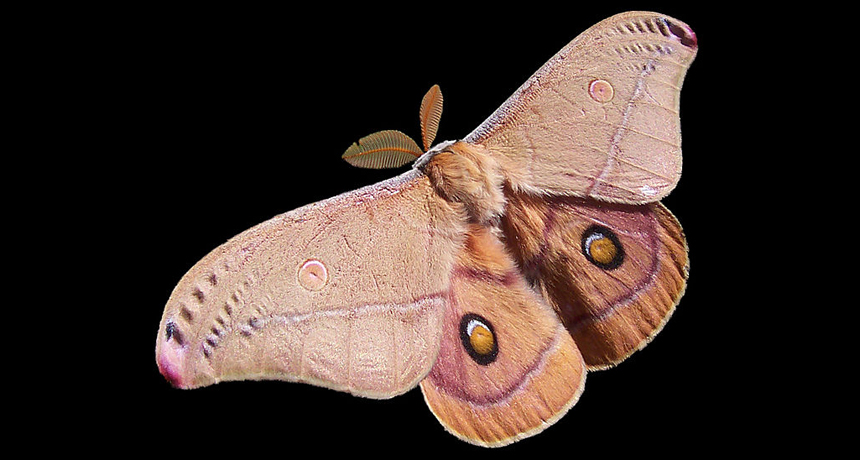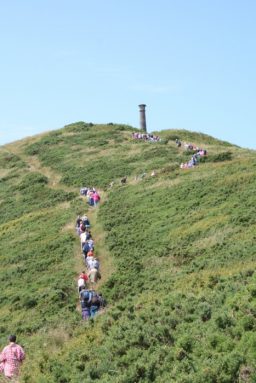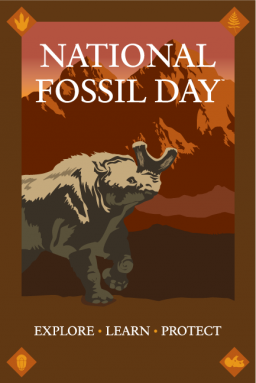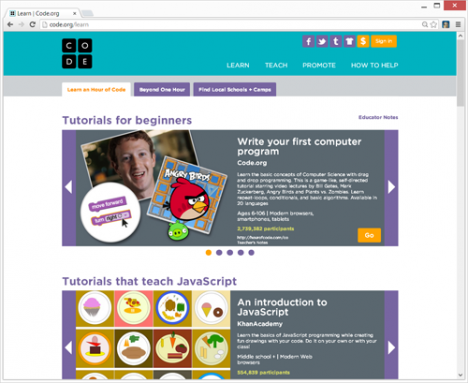Make 2014 a year of science

Even a moth deserves a National Moth Week. You can help track moths and learn more about them, celebrating the week in July.
Wikimedia Commons
Share this:
- Share via email (Opens in new window) Email
- Click to share on Facebook (Opens in new window) Facebook
- Click to share on X (Opens in new window) X
- Click to share on Pinterest (Opens in new window) Pinterest
- Click to share on Reddit (Opens in new window) Reddit
- Share to Google Classroom (Opens in new window) Google Classroom
- Click to print (Opens in new window) Print
It’s time to start the New Year off right by getting more science, technology, engineering and mathematics in your life.
Eureka! Lab is here to help! We are gathering as many STEM celebrations as we can. We also have tried to ensure that each month, day or week is educational rather than advocacy-based, and point to related activities offering links and educational resources so that teachers and parents can take every opportunity to engage in STEM activities with students.
Throughout the upcoming year, we will highlight some of these events with expanded blog coverage to remind you of this STEM calendar and how it might coordinate with both your classroom and extracurricular activities.
Jump to month: January, February, March, April, May, June, July, August, September, October, November, December
January
National Mentoring Month
United States
Mentoring applies to everyone, no matter what their field. Good mentors are vital to help young people succeed in STEM careers. Now is the time check out what the website has to offer, including its accompanying resources on how to become a mentor yourself. The site helps youth to find mentors who can help them in achieving their goals, whatever they might be.
Physics Education Week
January 4-11, Florida
Gov. Rick Scott kicked the year off right by dedicating the first week of January to emphasizing the “importance of physics education and research” to the intellectual, economic and social benefit of everyone. The state celebration coincided with the annual meeting of the American Association of Physics Teachers in Orlando, Fla.

February
World Wetlands Day
February 2
The United Nations has sponsored this day to build appreciation for the goals of its treaty on the conservation of wetlands, areas that are incredibly important to Earth’s ecosystems. The site offers a game and comic strip to help people of all ages understand healthy wetlands and the value of protecting them.
Discover Engineers Week
February 16-22, United States
Every year, DiscoverE sponsors a weeklong event to show how much engineers do for the world and to “bring engineering to life.” Professionals volunteer to speak to groups about their work. Their site offers a series of educational activities to help you design and carry out your own feats of engineering.
March
National Nutrition Month
United States
The Academy of Nutrition and Dietetics is sponsoring a month-long celebration of education on what makes a healthy human diet. They have a store full of seed packets, grocery shopping activity books and other materials for kids to help them understand the value of nutrition and to “enjoy the taste of eating right.”
National Groundwater Awareness Week
March 9-15, United States
The National Groundwater Association sponsors this week to educate all of us about this vital resource. Their “get involved” page has resources for teachers and links to online water activities aimed at kids through grade 5.
Brain Awareness Week
March 10-16
Every year, the Society for Neuroscience and the Dana Foundationsponsor a week to celebrate the science of the brain. Professional neuroscientists worldwide will be visiting classrooms and museums to teach kids of all ages about brain research. On the website, teachers can partner with neuroscientists during this week or find ideas for brainy projects at any time of the year.
National Science and Engineering Week
March 14-23, United Kingdom
Actually 10 days long, the United Kingdom’s celebratory “week” has STEM programs and events for kids and adults. The website includes quizzes and online games to help kids find out about science careers, as well as links to local activities.
SciFest Africa
March 12-18, South Africa
You don’t have to be in the Northern Hemisphere to get your science fix. This event offers a week of exhibits, workshops, games, quizzes and more. Last year, the event attracted more than 62,000 participants. This year’s theme will focus on astronomy and space exploration.
National Wildlife Week
March 17-23, United States
The theme for this year’s event is water, focusing on the resource that animals need most. The website offers an activity finder, online games and craft projects. It also links teachers to a large set of webinars, lesson plans and resources.
International Day of Forests
March 21
The United Nations has designated this as the day when people everywhere can celebrate the economic and ecological benefits that forests provide. While there is no home website for this celebration, other sites offer information about forests. And it’s a good day to hike out to your nearest woodland for a look around.
World Water Day
March 22
This day has been designated to help us learn and understand the vital role that water plays in everyone’s life. The website offers many informational links about the importance of Earth’s liquid assets. It includes a section for kids of all ages with information and games focused on natural resources, including energy.
World Meteorological Day
March 23
The World Meteorological Organization has compiled a rich set of resources for this event, including an entire site dedicated to youth. It includes lots of information on climate science, experiments and games, not to mention personal stories from kids on how climate change affects their daily lives.
National Agriculture Day
March 25, United States
Farmers rely on science to provide people all over the world with food. The site sponsors a high-school essay-or-video contest (deadline is January 31) and art contest, as well as resources for teachers and students.
April
Mathematics Awareness Month
United States
Where would STEM be without the M? Use April to celebrate the importance of numbers in our world. This year’s theme: Mathematics, magic and mystery. The event’s website features plenty of links to curriculum resources and other educational materials aimed at emphasizing the relevance of arithmetic, algebra, geometry and more.
Environmental Education Week
April 13-19, United States
Scheduled the week before Earth Day, this celebration offers educator toolkits and resources for things such as environmental project-based learning. The website also has a list of apps to help observe and learn about the environment. There are also pages that link environmental education with the Common Core Language Objectives and the Next Generation Science Standards. One section of the site for students offers grants and awards to help them design and implement their own projects to educate others about the environment.
Earth Day
April 22
No one could make a list like this without Earth Day. The theme for this year will be “green cities,” with sources for what communities can do to become more sustainable. Earth Day is always a great opportunity for all of us to learn more about how we impact our environment.
National Physics Day
April 24, United States
Use this day to celebrate the study of energy and matter. PhysicsCentral has plenty of experiments to perform at home or in the classroom, activity books to download and resources (like ask-a-physicist) to help inspire teens and others about the physical mechanisms behind everyday events and processes.
May
Migratory Bird Day
May 10, Western Hemisphere
Celebrate birds and their inspiring journeys with this event. The website offers educational materials in English and Spanish. You can pick up the basics of birding, study bird migration paths and learn about the habitats that birds move through on their travels.
International Day for Biodiversity
May 22
The United Nations has designated May 22 as the day to celebrate the huge variety of plants, animals, fungi and other species on our planet. This year’s focus is on the importance of islands and their unique ecosystems.
World Fish Migration Day
May 24
Birds aren’t the only animals who migrate vast distances. The World Wildlife Federation also asks us to celebrate long distance swimmers. Their site has a map of celebratory events around the world. It’s a great day to take a field trip to learn more about the world’s fishy travelers.
June
National Get Outdoors Day
June 14, United States
The last week of spring is one of the best times to see what’s sprouting. So there’s no better time to have a day dedicated to escaping cities and suburbs, even for just an hour or two. This site has a list of locations with activities to get teens and others outdoors. Find one near you or nominate a new site.
National Insect Week
June 23-29, United Kingdom
Creepy-crawlies play a vital role in most ecosystems. This event encourages us to learn about all that bugs can do for us. Based in the United Kingdom, this website offers educational resources on insects, as well as opportunities to get out and observe some yourself.
July
Day of Archeology
July 11
To most kids, Indiana Jones epitomizes the sweep and grandeur of archeology. But there’s more to this field than swashbuckling adventures. This is a day when real archeologists will take time out to explain what they do, in their own words. A website presents personal stories from such scientists the world over.
Festival of Archeology
July 12-27, United Kingdom
Every year this event celebrates the study of human culture and how it deepens our sense of history. This festival invites the public to learn more about archeology at sites around the country. Its website not only allows you to search for lectures, but also suggests hands-on activities and points people to historical reenactments and guided tours.
National Moth Week
July 19-27, United States
A warm summer night is the perfect time to celebrate these winged creatures and learn about the important role that moths play in our ecosystems. With the help of the website’s educational resources, you can use this week to find and identify moths. You can then report the numbers and types of moths you saw on their website. Your data can contribute to studies that track the distribution of particular species around the country.
The Big Butterfly Count
July 19-August 10, United Kingdom
After tracking moths by night, move on to pursuing butterflies and day-flying moths as part of a second national survey. Because these bugs respond very quickly to changing conditions, they can be important indicators of alterations taking place in their local environment. The Count’s website lets you download a butterfly identification chart. You can then record your sightings using their website or their new smartphone app.
National Marine Week
July 27-August 11 (2013 dates), United Kingdom
The Wildlife Trusts offers numerous events to let you “uncover the magic of the marine world.” Keep an eye on their website for 2014 dates.
August
National Forensic Science Week
August 11-17 (2013 dates), United States
If you’ve read our blog on ‘The Poisoner’s Handbook’ or last year’s Cool Jobs profiles of crime-scene investigators, you’ll know that forensics offers fascinating career opportunities based on state-of-the-art science. This new event, sponsored by the Consortium of Forensic Science Organizations, will run talks and lab tours to show the public how forensic science really works. Keep an eye on the event’s website for 2014 dates.
National Honeybee Day
August 16, United States
End your summer on a sweet note. Honeybees are especially important pollinators that play a vital role in producing the food we eat and the flowers we love. The website promotes beekeeping but also has some important information about honeybees.
September
Pollution Prevention Week
September 14-21, United States
Kick off your school year with a week-long focus on avoiding waste and environmental degradation. The Environmental Protection Agency sponsors aweek for education and awareness about how we risk harming our environment — and ways to limit those impacts.
October
World Space Week
October 4-10
Take part in an international celebration to show support for space exploration and science. The website is now accepting registration for 2014 events. The site also offers teacher activity guides to bring the wonder of the cosmos to the classroom.
Biology Week
October 11-17, United Kingdom
The Society for Biology sponsors a week dedicated to the study of life. The website has a wealth of school resources on everything from where our food comes from to how to book a zoo bus full of tarantulas and bearded dragons to visit your school.
U.K. Fungus Day
October 12-13 (2013 dates), United Kingdom
There’s a fungus among us. Created last year with support from the British Mycological Society, this event strives to help people appreciate the role that fungi play in keeping ecosystems healthy, without forgetting their pathogenic potential. Keep an eye on the webpage for public outreach activities.
Maths Week
October 11-19, Republic of Ireland and Northern Ireland
Every year, Ireland hosts community math events as well as daily puzzles in the Irish Times to get everyone enthusiastic about numbers. The website has links to games available for purchase.
Earth Science Week
October 12-18, United States
Organized by the American Geosciences Institute, this week-long event is devoted to helping the public understand more about geology, geophysics, soil, water and the atmosphere. The website offers links for teachers with classroom activities and opportunities to participate in scientific research. There are also links for students with contests, career resources and internship openings.

National Fossil Day™
October 15, United States
The National Park Service sponsors a day each year for aspiring paleontologists of all ages to get to know their fossils. Its website offers games, activities and opportunities to meet people who study fossils, as well as resources for parents and teachers. There is even a guide to making your own fossil. Keep an eye on the website for events in your area.
National Chemistry Week
October 19-25, United States
This year’s theme is one that everyone can get behind: the sweet chemistry of candy! Sponsored by the American Chemical Society, the organizing site offers pages of resources for educators at every level and activities for students, as well as suggested activities to promote chemistry in your community.
November
Physiology Understanding Week
November 3-7, United States
Get ready for a “PhUn” week. This program brings together the scientists who study how bodies function with local schools. Physiologists can share information about their careers and promote public appreciation of what their research has taught us. The American Physiology Society’s website offers educational projects and learning resources.
Geography Awareness Week
November 16-22, United States
In today’s global world, it is sometimes easy to forget the role that place has played in our lives and our history. The National Geographic Society is sponsoring a week to help people understand their relationship to their environment. Take this opportunity to include geography in your curriculum with the resources available on the Society’s website.
Geographic Information Systems Day
November 19, United States
Take a day to celebrate the importance of homing in on precisely where things take place. Part of Geography Awareness Week, this event has its own website to show that every map tells a story. Use this day to learn about the importance of maps in our lives, and learn how they are made. Keep an eye out for events near you.
World Toilet Day
November 19
At first a day dedicated to your bathroom might seem silly — if not downright gross. But over 2.5 billion people around the world lack access to places where they can safely deposit human wastes. This puts public health at risk. Use this day to teach teens about the vital importance of sanitation.
National Tree Week
November 29-December 7, United Kingdom
Winter is tree planting season in Britain. You can take the opportunity to plant a tree there — or wherever home might be. You also can use this seven-day event to participate in seed gathering, probe the role of trees as the effective lungs of our planet or assemble a list of 10 too-cool facts about trees.
December
Computer Science Education Week
December 9-15 (2013 dates), United States

Last December saw the launch of the Hour of Code, a project that encouraged everyone to spend at least an hour trying to write small programs for a computer. Many celebrities promoted the project and the website is still live with lots of educational and entertaining coding activities. Keep an eye out for the 2014 dates, and bring computer programming to your school.
Eureka! Lab is eager to make the best possible STEM week calendar. If you know of a major event lasting a day or longer that we have missed, please contact Eureka! Lab on Twitter at @eureka_labs, or via email.
Power Words
agriculture The growth of plants, animals, or fungi for human needs, such as food, fuel, medicine or other uses.
archeology The study of human history, performed by analyzing things that previous humans have left behind, from houses to clothing to footprints.
astronomy The area of science that deals with celestial objects, space and the physical universe as a whole. People who work in this field are called astronomers.
biodiversity The number and variety of organisms found within a geographic region.
biology The study of living things. The scientists who study them are known as biologists.
chemistry The field of science that deals with the composition, structure and properties of substances and how they interact with one another. Chemists use this knowledge to study unfamiliar substances, to reproduce large quantities of useful substances, or to design and create new and useful substances.
climate The weather conditions prevailing in an area in general or over a long period.
dietetics Things related to the diet or changes that adapt the diet for individuals with special nutritional needs.
ecosystem A group of interacting living organisms — including microorganisms, plants and animals — and their physical environment within a particular climate. Examples include tropical reefs, rainforests, alpine meadows and polar tundra.
forensics The use of science and technology to investigate and solve crimes.
fossil Any preserved remains or traces of ancient life. There are many different types of fossils: The bones and other body parts of dinosaurs are called “body fossils.” Things like footprints are called “trace fossils.” Even specimens of dinosaur poop are fossils.
fungus (plural: fungi) Any of a group of unicellular or multicellular, spore-producing organisms that feed on organic matter, both living and decaying. Molds, yeast and mushrooms are all types of fungi.
geography The study of Earth’s features and how the living and nonliving parts of the planet affect one another.
groundwater Water held underground in the soil or in pores and crevices in rock.
habitat The area or natural environment in which an animal or plant normally lives, such as a desert, coral reef or freshwater lake. A habitat can be home to many different organisms.
marine Having to do with the ocean world or environment.
mentor An individual who lends his or her experience to advise someone starting out in a field. In science, teachers or researchers often mentor students, helping them refine their research questions. Mentors can also offer feedback on how young investigators prepare to conduct research.
meteorologist Someone who studies weather and climate events.
migration Movement from one region or habitat to another, especially regularly and according to the seasons.
neuroscience Science that deals with the structure or function of the brain and other parts of the nervous system. Researchers in this field are known as neuroscientists.
paleontologist A scientist who specializes in studying fossils, the remains of ancient organisms.
physics The scientific study of the nature and properties of matter and energy. Classical physics An explanation of the nature and properties of matter and energy that relies on descriptions such as Newton’s laws of motion. It’s an alternative to quantum physics in explaining the motions and behavior of matter.
physiology The branch of biology that deals with the everyday functions of living organisms and how their parts function.
pollinate To transport male reproductive cells — pollen — to female parts of a flower. This allows fertilization, the first step in plant reproduction.
pollutant A substance that taints something — such as the air, water, our bodies or products. Some pollutants are chemicals, such as pesticides. Others may be radiation, including excess heat or light. Even weeds and other invasive species can be considered a type of biological pollution.
sanitation The protection of human health by preventing contact with our bodily wastes through hand washing, use of toilets or latrines, separation of wastes from drinking-water sources and disinfecting foods and materials that may be ingested or otherwise enter the body.
sustainability To use resources in a way that they will continue to be available in the future.
wetland A land area that is covered in water, either permanently or seasonally. Wetlands are a specific type of ecosystem, with its own plant and animal life that can live nowhere else.